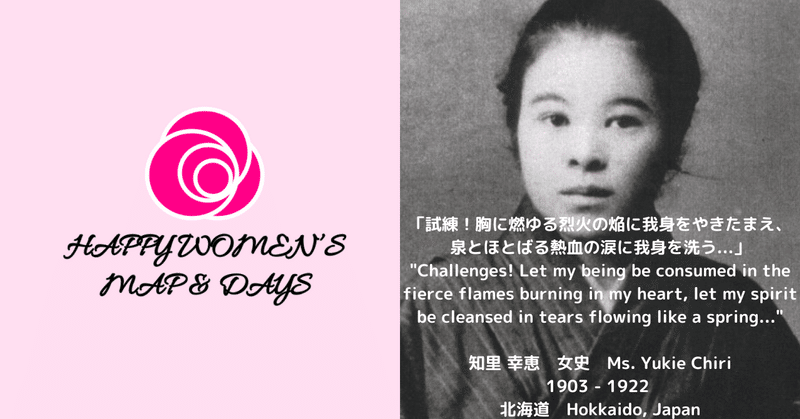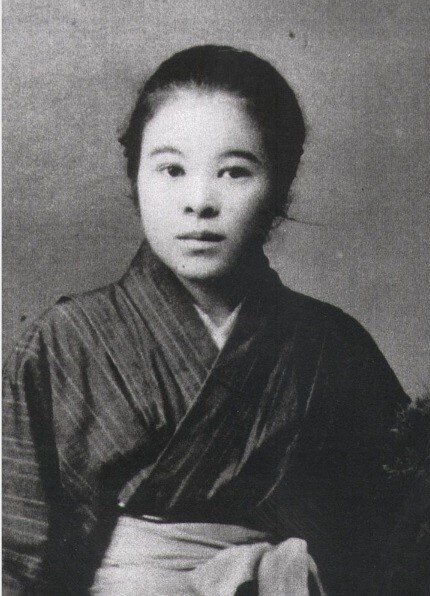
Happy Women's Map 北海道 日本初アイヌ作家 知里 幸恵 女史

「試練!試練!!胸に燃ゆる烈火の焔に我身をやきたまえ、泉とほとばる熱血の涙に我身を洗う...」
"Challenges! Let my being be consumed in the fierce flames burning in my heart, let my spirit be cleansed in tears flowing like a spring..."
知里 幸恵 女史
Ms. Yukie Chiri
1903 - 1922
北海道登別市登別本町2丁目 生誕
Born in Noboribetu-city, Hokkai-Do
知里幸恵女史は日本で初めてアイヌの物語『アイヌ神謡集』を社会に発表したアイヌ女性作家です。
Ms. Yukie Chiri is the author of "Ainu Kamuy Yukar" (Ainu Divine Songs), the first written collection of Ainu narratives by an Ainu person.
********
「亡国のアイヌ」
知里幸恵女史はアイヌの両親の父・高吉と母・ナミのもとに生まれます。
幸恵の父・高吉は南部藩侍の血を引き、登別温泉開発者・滝本金蔵夫妻に奉公して可愛がられ、読み書きそろばんを学んで山林や土地の払い下げを受け、知里牧場をアイヌの仲間と経営を始めます。日露戦争では旭川第七師団に入隊して203高地攻略の激戦を戦い抜いて金鵄勲章を受章するも、満足に働くことが出来ない状態になって戻ります。幸恵の母・ナミは姉のマツとともに、函館に出てイギリス人宣教師ジョン・バチラーによる愛隣学校でキリスト教や英語を学びながら伝道師の資格を得、日高の教会で伝道活動に従事していました。幸恵の母方の曽祖父・吉蔵は登別でアイヌと和人の両者に人望と財力を持ち、ジョン・バチラーの後援者として教会建設に協力するも、やがて和人に騙され全財産を奪われていました。ナミは高吉と結婚して農場の開拓に従事、重労働のできない体となった高吉の代わりに開墾・農作業など重労働を担って一家を支えます。知恵が生まれる少し前の1899年に明治政府は『北海道旧土人保護法』を制定。アイヌの土地の没収、収入源である漁業・狩猟の禁止、アイヌ固有の習慣風習の禁止、日本語使用の義務、日本風氏名への改名による戸籍への編入、など次々と実行に移され、アイヌ民族の生活・アイヌ伝統文化は消滅の危機に瀕していました。
「アイヌ讃美歌 YESU EN OMAP」
知恵は室蘭の登別川沿いで生まれ、6歳のときに祖母・モナシノウクと暮らす母の姉・マツの養女として引き取られます。マツは日本聖公会で布教活動をしながら日曜学校を開いてアイヌ女性に裁縫・読書・ローマ字等を教えており、幸恵も子供たちと「アイヌ讃美歌」を歌ったりしてマツを手伝います。モナシノウクは吉兆を占うアイヌの巫女でアイヌの口承叙事詩“カムイユカラ"の謡い手で、幸恵はモナシノウクから自然の神々の神話や英雄の伝説を学びます。幸恵は母方の叔父・太郎が政府と直接交渉して建設したキリスト教系アイヌ学校で学びます。太郎はアイヌ学校の教師に就任するも、アイヌ自治を目指す嘆願書を国会に提出しに行く過程で行方不明となっていました。幸恵は同化教育のもと必死で日本語を勉強して、アイヌ子女で初めて北海道旭川高等女学校を受験するも不合格。その後、14歳の時にアイヌ子女で初めて旭川区立女子職業学校に110人中4番で入学。唯一のアイヌ生徒として、同級生から差別やいじめに遭いながらも、片道6kmの道のりを歩いて通いながら勉学に励みます。「私に今まで友達といふものが真にあったであらうか」。やがて、知恵は心臓病を患い学校を休みがちになります。そんな中でも、日曜学校で出会ったアイヌの青年・村井曾太郎とアイヌの将来について語り合いながら結婚を約束します。
「アイヌ叙事詩」
幸恵が15歳の時、言語学者の金田一京助が幸恵の祖母・モナシノウクを訪ねてきます。「世界五大叙事詩」と絶賛してモナシノウクの謡うユーカラを夜遅くまで熱心に聞き取って記録する金田一。幸恵は通訳を手伝いながら決意します。「私のため、同族であるアイヌ民族のため、アイヌ語を研究している金田一先生のため、学術のため、日本のため、世界万国のために私は書くのだ」。京助と手紙のやり取りをしながら、幸恵は"カムイユカラ"のローマ字筆記を始めます。心臓病が悪化する中、幸恵はノート3冊にわたって日本語に翻訳した「アイヌ伝説集」を金田一に送付します。出版を計画する金田一から上京の誘いを受けた幸恵は、反対する両親を説き伏せ、恋人・曾太郎の実家で仮祝言を挙げます。「必ず務めを果たして帰ってきます。チカップニの水辺に帰って来る渡り鳥のように」。東京・本郷の金田一宅に迎えられた幸恵は、東京で好奇の目にさらされながらも、教会に通ったり、産後鬱で伏せる京助の妻・静江と一緒に子供たちの世話をしたり、『女学世界』に寄稿したりしながら、京助と協力して翻訳・編集・推敲作業を続けます。ある日、幸恵はマツの便りで和人の女郎屋に売られた友人・やす子の死について知らされ激昂すると、金田一は諭します「だから、アイヌは、見るもの、目の前のものが、すべて呪わしい状態にあるのだよ」。「試練!試練!!胸に燃ゆる烈火の焔に我身をやきたまえ、泉とほとばる熱血の涙に我身を洗う」。上京して4か月余り、幸恵は心臓発作を起こしながらも『アイヌ神謡集』を完成させます。まさにその夜に、2度目の心臓発作を起こして19歳で死去します。
"Ainu of the Lost Nation"
Ms. Yukie Chiri was born to Ainu parents, her father, Takayoshi, and her mother, Nami. Her father, Takayoshi, had samurai blood from the southern clan and worked for the Takimoto Kanezo couple, who were developers of the Noboribetsu Onsen. He was treated kindly by them and learned how to read, write, and do arithmetic. He also received land for forestry and agriculture, starting the management of the Chiri Ranch with Ainu colleagues. During the Russo-Japanese War, he joined the 7th Division of Asahikawa, fought valiantly in the fierce battle for Hill 203, and was awarded the Order of the Golden Kite. However, after returning, he found it difficult to work adequately. Yukie's mother, Nami, along with her sister Mats, went to Hakodate, where they studied Christianity and English at the "Love Thy Neighbor School" run by British missionary John Batchelor. They also acquired qualifications as evangelists and worked at the church in Hidaka. Yukie's maternal great-grandfather, Yoshikura, was a respected and wealthy figure among both Ainu and Japanese in Noboribetsu. He had supported John Batchelor's efforts to build the church, but he was eventually deceived by the Japanese, who took away his entire fortune. Nami married Takayoshi and contributed to the family by taking on the demanding tasks of clearing land and agricultural work due to Takayoshi's inability to perform heavy labor. In 1899, just before Yukie's birth, the Meiji government enacted the "Former Hokkaido Natives Protection Law." This led to the confiscation of Ainu lands, prohibition of their sources of income such as fishing and hunting, suppression of Ainu customs and traditions, compulsory use of the Japanese language, mandatory adoption of Japanese-style names, and integration into Japanese-style family registers. These measures placed the Ainu way of life and traditional culture at risk of extinction.
"Ainu Hymn - YESU EN OMAP"
Kieko was born along the banks of the Chitose River in Muroran, and at the age of six, she was taken in by her aunt, Matsu, while living with her grandmother, Monashinouk. Matsu, a member of the Japanese Anglican Church, conducted missionary work and ran a Sunday school for Ainu women, teaching them sewing, reading, Roman letters, and more. Kieko assisted Matsu, singing Ainu hymns with the children. Monashinouk was an Ainu priestess who foretold good fortunes and chanted the Ainu epic "Kamuy Yukar." From her, Kieko learned the myths of the natural gods and legendary heroes. Kieko received her education at a Christian Ainu school constructed through negotiations by her maternal uncle, Taro, with the government. Taro took on the role of a teacher at the Ainu school but went missing while delivering a petition to the parliament for Ainu autonomy. Kieko persevered under the assimilationist educational system, studying Japanese diligently. She became the first Ainu girl to attempt to enter the Hokkaido Asahikawa Girls' High School but faced rejection. At the age of 14, she entered the Asahikawa Municipal Girls' Vocational School, ranking fourth among 110 students. As the only Ainu student, she experienced discrimination and bullying from her classmates but continued her studies, walking 6 km to school every day. Kieko once said, "Have I ever truly had friends?" She persevered despite heart disease and irregular school attendance. During this time, she met an Ainu youth, Sotaro Murai, at a Sunday school, and they promised to marry while discussing the future of the Ainu people.
"Ainu Epic"
At the age of 15, Kieko was visited by linguist Kyosuke Kindaichi who came to meet her grandmother, Monashinouk. Kindaichi passionately recorded Monashinouk's chants of "Yukara" late into the night, praising them as one of the world's great epics. Kieko assisted as an interpreter and made a resolute decision: "For my sake, for the Ainu people, for Mr. Kindaichi, for the sake of scholarship, for Japan, and for the entire world, I will write." Kieko began transcribing "Kamuy Yukar" in Roman letters. While her heart disease worsened, Kieko translated a three-volume collection of Ainu legends into Japanese. She sent this to Kindaichi for publication. Kindaichi invited her to Tokyo for further collaboration, and Kieko, against her parents' opposition, held a mock wedding at her lover Sotaro's family home, promising, "I will fulfill my duty and return. Like a migratory bird returning to the shores of Chikappu." Welcomed into Kindaichi's Tokyo home in Hongo, Kieko faced curious stares but attended church, cared for children with Kindaichi's wife, Shizue, and continued her translation, editing, and proofreading work with Kindaichi. One day, Kieko learned from a letter from Matsu that her friend, Yasuko, had been sold to a brothel run by Japanese women and had died. Kieko, filled with rage, received Kindaichi's counsel: "This is why the Ainu people regard everything they see before them as accursed. A trial! A trial!! Let the flames of intense passion burn within your heart. Wash yourself in tears of fervor gushing like a spring." After just over four months in Tokyo, Kieko completed the "Ainu Hymn Collection" despite experiencing her second heart attack, passing away at the age of 19 that very night.
-知里幸恵 銀のしずく記念館 Chiri Yukie Memorial Museum
-北海道新聞 Hokkaido News

Share Your Love and Happy Women's Story!
あなたを元気にする女性の逸話をお寄せください!
Share your story of a woman that inspires you!
この記事が気に入ったらサポートをしてみませんか?
